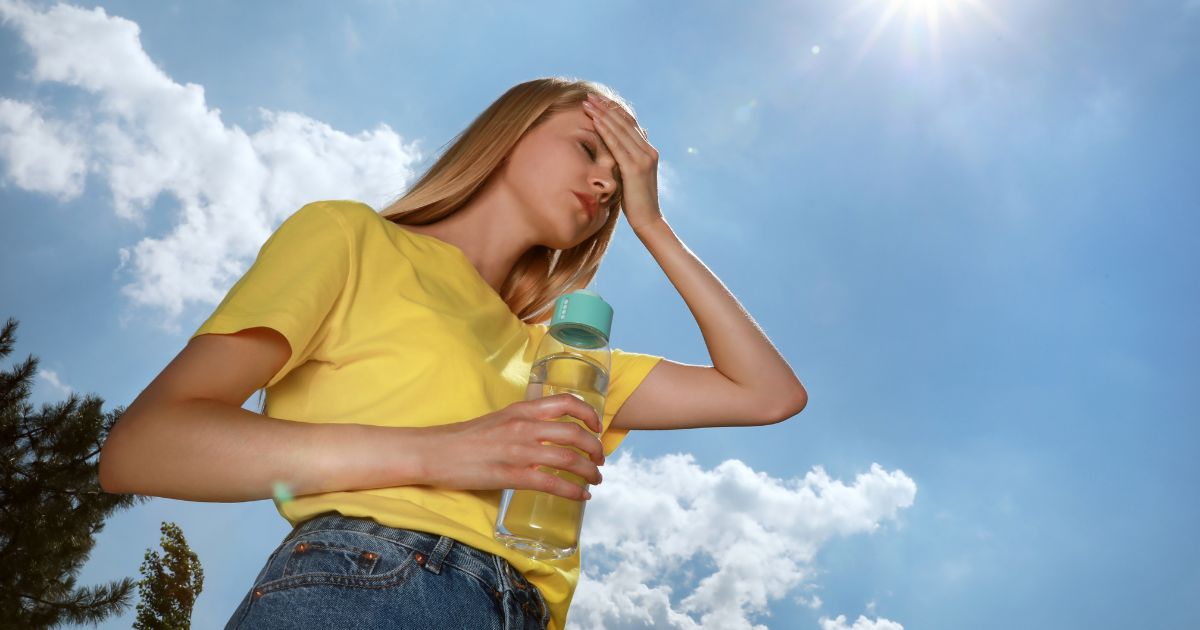With a heatwave upon us, it’s especially important that we’re practicing sun safety: Whether that’s staying hydrated, seeking shade or slapping on the SPF.
Whilst we all know the sun can be damaging, from sunburn to heatstroke, experts have issued a warning about the unexpectedly complicated relationship between heat and some prescription medications.
Many of the meds on this list are surprisingly common, yet they can trigger sun sensitivity and heat intolerance. With yellow weather warnings in place across the UK this week, it’s crucial to understand how they might be affecting you.
Nish Shah, a primary care sports medicine doctor at Houston Methodist, explained that some medications affect the body’s ability to regulate temperature, raising the risk of heat exhaustion and heat stroke, whilst others increase skin sensitivity to sunlight, leading to a higher risk of sunburn and skin damage.
So, which medications can be affected by heatwaves?

via Canva
These heat-sensitive medications are prescribed for a wide range of conditions, from managing blood pressure or bladder issues, to aiding weight loss and treating mental health issues like anxiety or depression.
- Anticholinergics: Drugs which block signals to sweat glands, can reduce the body’s ability to cool itself through sweating.
- Beta Blockers slow your heart rate, limiting blood flow and reducing the body’s cooling efficiency.
- Stimulants increase your metabolism, which can impair the body’s natural cooling processes.
- Antidepressants affect the hypothalamus, which is the brain’s temperature regulator, and can reduce sweating.
- GLP-1 Drugs, a popular weight loss medication that suppresses thirst, make dehydration more likely.
- Diuretics increase urine production. This can cause fluid loss, reduced sweating and a higher risk of dehydration.
And which medications can be affected by the sun?
It’s not just the heat that can be a cause of concern; some drugs increase your sensitivity to the sun, making you more susceptible to sunburn or skin damage. Where retinoids treat acne and other skin conditions, diuretics are prescribed for high blood pressure or fluid retention. Other drugs on the lost reduce pain and inflammation and fight bacterial infections.
- Retinoids thin the outer skin layer, weakening its natural defence against UV rays and increasing vulnerability to sun damage.
- Antidepressants make the list again, as certain tricyclic types can heighten sensitivity to UV light, making skin more prone to damage.
- Antibiotics, especially drugs like doxycycline, ciprofloxacin and sulfonamides can interact with UV rays, leading to skin cell damage.
- Nonsteroidal Anti-Inflammatory Drugs (NSAIDs), which are medications like ibuprofen and naproxen, can trigger phototoxic reactions when exposed to sunlight.
- Diuretics (especially thiazides) also appear again, as they can increase your risk of photosensitivity, making skin more reactive to UV exposure.
What can you do to stay safe in the heat?
If you take any of these medications, there are steps to take for reducing your risk of heatstroke or skin damage.
Before you step outside, make sure you can recognise heat-related issues like dizziness, sudden confusion or excessive sweating. These can signal heat exhaustion or even heatstroke, both of which need urgent attention.
Hydration is also your best defence, especially if you’re on diuretics or GLP-1 treatments. Your body is losing fluids more quickly, so keep a bottle of water with you and take regular sips.
Aim for shaded spots, too, to ensure you’re staying cool whenever possible. If you need to exercise, stick to early mornings or late evenings when it’s not as warm.
Although it sounds self-evident, it really is crucial to protect your skin from the sun. Apply a broad-spectrum SPF 30+ before heading outdoors, and reapply as the label suggests. Wearing lightweight, loose-fitting clothes in pale colours will also help your body release heat and let sweat evaporate more easily.
Featured image via Canva
